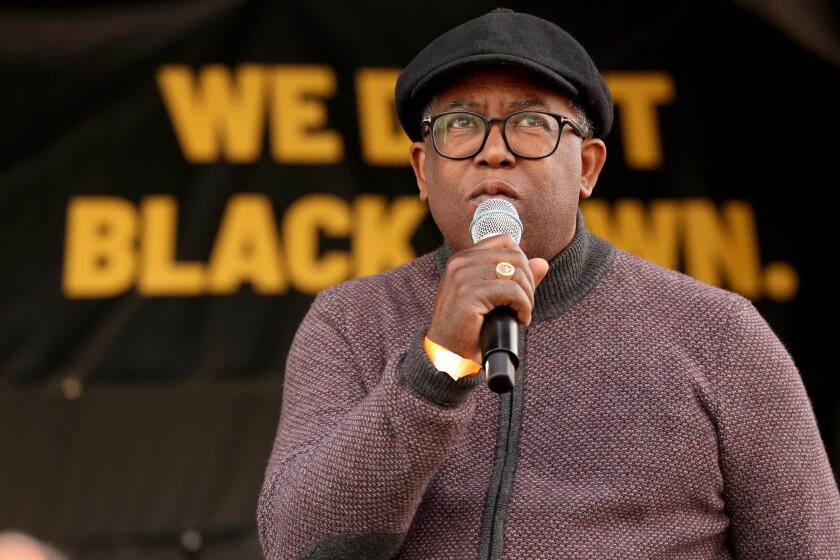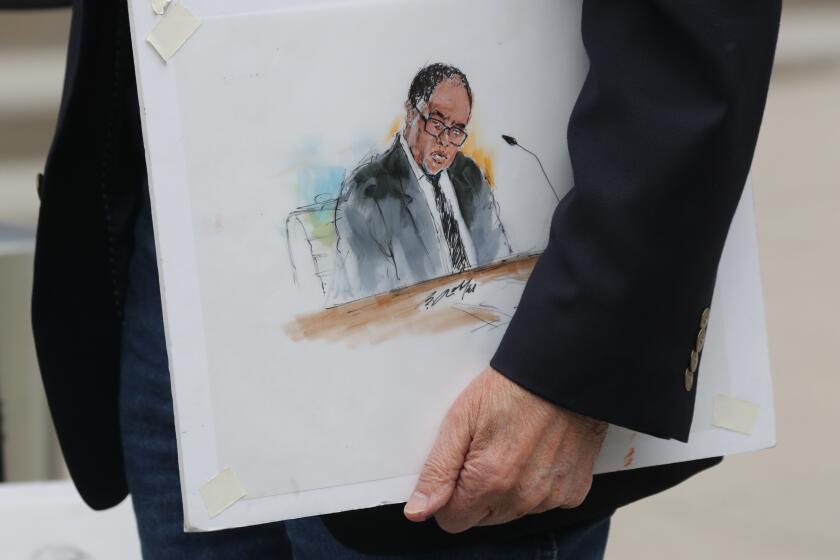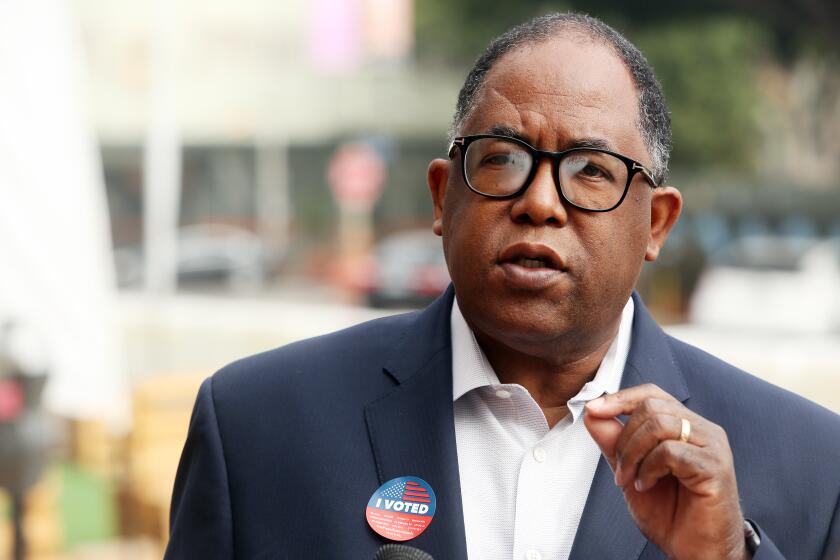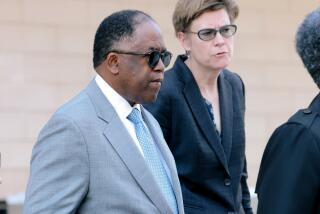Column: Who is Mark Ridley-Thomas — saint or sinner? Or is there a third choice?
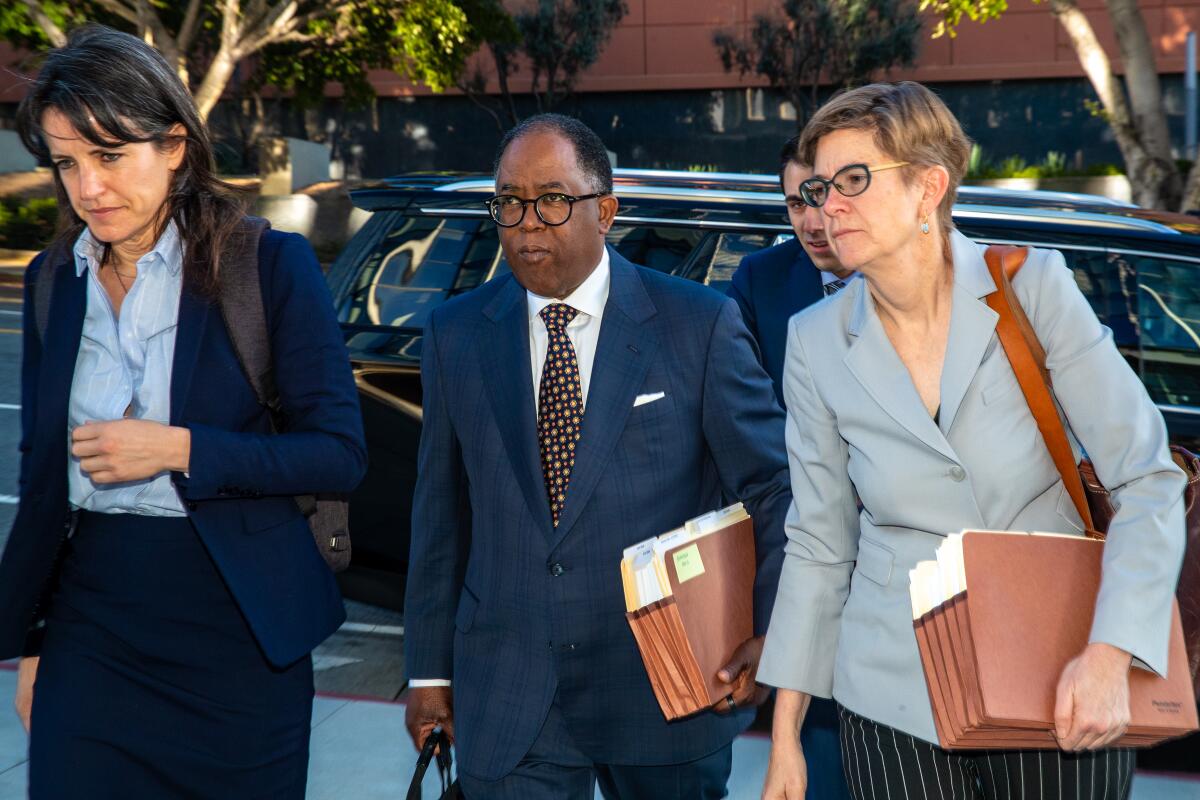
- Share via
The reaction to former L.A. City Councilman Mark Ridley-Thomas’ conviction for bribery, conspiracy and fraud has been, to say the least, highly unusual.
As both my colleague Erika Smith and a subsequent news article pointed out, Ridley-Thomas is not facing the public disgust, outrage and condemnation that usually accompany a corruption verdict, but, on the contrary, is receiving “tributes instead of scorn.”
Opinion Columnist
Nicholas Goldberg
Nicholas Goldberg served 11 years as editor of the editorial page and is a former editor of the Op-Ed page and Sunday Opinion section.
Shortly after the jury found him guilty of seven felonies last week, the mayor of Los Angeles called Ridley-Thomas “a thought leader” and “a champion for our city.” A former City Council colleague called him “the relentless advocate, the unstoppable force.” The people of his community remembered him as a 40-year veteran of activism and politics who devoted his life to public service.
This outpouring of support and gratitude for a convicted felon seems to be causing some confusion. Which is Ridley-Thomas really, people seem to be asking — a saint or a sinner?
Why, they want to know, is a man who is receiving such enthusiastic praise from public officials and from his constituents facing the possibility of several years in prison? Should we consider him a good man who spent a lifetime fighting effectively for marginalized and needy constituents in neglected neighborhoods, or a self-serving, bribe-taking pol who abused his power for his own personal gain?
A jury found the longtime politician guilty in a sprawling federal case involving a quid pro quo with USC. Replacing him won’t be easy for Black L.A.
Some of his supporters are apparently angry that the government would even bother to prosecute a man who has done so much for Los Angeles. Some have concluded that he must have been railroaded or subjected to a witch hunt or racially targeted or victimized in some other travesty of justice.
And I guess a travesty might have occurred. Maybe the jury got it wrong; maybe there was no quid pro quo and he was unjustly convicted. Ridley-Thomas, who has denied wrongdoing from the start, will certainly have an opportunity to make that argument when he appeals his case. I wish him luck; I too have known and admired him for many years.
But there is another possible explanation, and that is that both versions of the narrative are true, that Ridley-Thomas is both an ardent and effective fighter for his constituents and a bribe taker. Sure, there’s some cognitive dissonance required to take that in. But isn’t that the truth about human beings? We contain multitudes.
Mayor Karen Bass described convicted Councilmember Mark Ridley-Thomas as a champion of the city, a thought leader and “a policymaker who made a real impact.”
Ridley-Thomas can be the reformer of the Los Angeles Police Department, the champion of reopening Martin Luther King Jr. Community Hospital, the fighter against homelessness and the caring public servant with deep ties to an underserved, marginalized community — and the guy who took special benefits for his son, Sebastian, from the then-dean of USC’s social work program in return for supporting a county contract for the university. Prosecutors said he accepted free graduate school tuition and a paid professorship for Sebastian.
It’s possible because people are complicated. They’re inconsistent. They can be tempted — and sometimes they succumb, especially when their children are involved.
Many people suggested in the L.A. Times stories that Ridley-Thomas’ crimes are outweighed by all he accomplished over the years. That’s a matter of opinion, but I think it’s probably true. It’s also true that removing him from government will deal a blow to the city, the region and the communities he represented.
Too many Angelenos are angry that Ridley-Thomas, who cared so much about justice, was found guilty of corruption. In their minds, that means justice wasn’t served. But it was.
But even if his good works outweigh his crimes, they don’t excuse them. The simple truth is that he didn’t have the right to take valuable favors in return for official acts, which is what the jury concluded he did.
Selling your office for personal gain is something that cannot be tolerated. The fact that he’s 68 years old, that he did it for his son, that he might have supported the USC contracts even if he hadn’t been offered a bribe and that his council district will go unrepresented for some period of time — none of that has any bearing on whether he is guilty.
Like Councilman José Huizar and Councilman Mitchell Englander before him, Ridley-Thomas was found to have betrayed the public trust.
Does that mean that all his years of doing good are meaningless and should count for nothing? Of course not.
Ridley-Thomas’ life story and all the work he’s done and the benefits he’s brought to L.A. — and any other mitigating circumstances his supporters want to highlight — are totally appropriate subjects for his sentencing, which is currently scheduled for Aug. 21. It is common for family members, friends, colleagues and associates of the defendant to submit letters in advance explaining why leniency is warranted.
Who is Mark Ridley-Thomas in his totality? He’s complex and contradictory like the rest of us, I suspect. The jury weighed the evidence of his guilt; the judge must weigh the man in full before deciding what his sentence should be.
More to Read
A cure for the common opinion
Get thought-provoking perspectives with our weekly newsletter.
You may occasionally receive promotional content from the Los Angeles Times.

